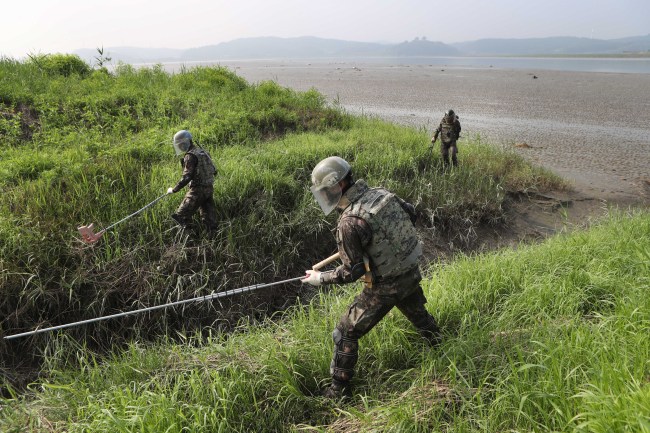As North Korea keeps its silence, South Korea’s proposal of military and humanitarian talks appears to be hanging in the balance on Thursday, deepening frustration among the Moon Jae-in administration officials.
On Monday, Seoul suggested the two Koreas’ militaries hold talks on Friday at the truce village of Panmunjeom to discuss a halt in “all acts of hostility,” and their Red Cross officials meet and arrange a fresh round of reunions of separated families.
Four days on, however, cross-border communication channels remained idle and state media showed little interest in the overture.
 |
South Korean soldiers on Thursday search the Imjin River basin in Paju, Gyeonggi Province, for mines that may have been drifted from the North. (Yonhap) |
The Rodong Sinmun, the ruling Workers’ Party mouthpiece, threw cold water over Seoul’s drive, saying in an editorial that it is “nonsense” for the South to float an inter-Korean thaw while publicly displaying its hostilities and ambition for confrontation.
“I would say we’re awaiting the North’s official position,” South Korean Defense Ministry spokesman Moon Sang-gyun said at a news briefing, declining to directly address the editorial.
“The preparations for the talks are under way without a hitch,” he added, noting the West Sea military hotline is ready to receive any message from the other side.
A Unification Ministry official said the agency will also continue to wait for Pyongyang’s response.
“There is no deadline for our efforts to resolve the problem through dialogue,” the official told reporters.
“Despite the series of ups and downs, we have to return to the spirit of past inter-Korean peace agreements and take the path for building trust. In that regard, I think the North’s position would be not much different.”
Pyongyang’s response, if any, would be a crucial gauge for the inter-Korean ties over the first few years of the Moon administration.
For the nascent leadership, the offer was a first step that could lead to a restart of long-dormant hotlines, regular exchanges and eventually denuclearization and peace treaty negotiations.
Many Seoul officials were seen cautiously optimistic, saying the offer has components that may well be appealing to the Kim Jong-un regime, such as a suspension of propaganda loudspeaker broadcasts along the border. Though the Friday military meeting is virtually impossible to take place, the North could make counterproposals and agree to future talks, they say.
But skeptics offered more downbeat prospects. Even if they manage to sit down, it would be difficult for the sides to reconcile their differences given Pyongyang’s persistent refusal to even discuss denuclearization. Last month, Kim Yong-chol, a senior official in the North’s Committee for the Peaceful Unification of Korea in charge of inter-Korean affairs demanded in an interview that 13 defectors be repatriated as a precondition for family reunions, which is most likely unacceptable to Seoul.
“There would be some kind of answer any way from the North, but it would be difficult for the two Koreas to improve their ties given the highly negative attitude it showed in the Rodong Sinmun piece,” said Cheong Seong-chang, head of unification strategy at the Sejong Institute.
By Shin Hyon-hee (
heeshin@heraldcorp.com)







![[Today’s K-pop] Blackpink’s Jennie, Lisa invited to Coachella as solo acts](http://res.heraldm.com/phpwas/restmb_idxmake.php?idx=644&simg=/content/image/2024/11/21/20241121050099_0.jpg)
